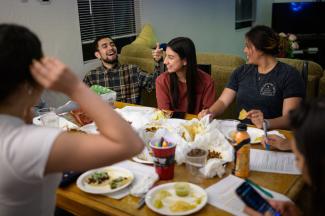Why Your LaFe Small Group — and Every InterVarsity Small Group — Should Study Exodus

When I was a student in LaFe, my small group leader felt led to guide us through the entire book of Exodus. As we studied, we began resonating with Moses, discovering just how much of his journey spoke to our own experiences.
In celebration of Latino/Hispanic Heritage Month, we encourage you to consider walking through Exodus with your InterVarsity community. Whether you’re part of a LaFe group or not, Exodus carries powerful lessons for anyone grappling with their identity, their calling, or their responsibility to their community. Plus, InterVarsity’s LaFe ministry has created a great resource to help you along! Check that out here.
Below are a few reasons your LaFe group (and every InterVarsity small group) can benefit from an Exodus Bible study series. Note that the discussion questions should be adapted to fit the experiences of your specific campus community.
God Shows Moses His Identity is Not a Curse
While studying Exodus as a student, I wondered how much of Moses’ inner turmoil could have been helped if he had a community like LaFe.
Moses was born a Hebrew but raised as an Egyptian when Egyptians brutally oppressed the Hebrews. Naturally, his dual identity creates confusion about where he truly belongs.
In chapter 2, one day after killing an Egyptian, Moses tries to break up a fight between two Hebrews. One of them challenges him: “Who made you a ruler and judge over us? Are you thinking of killing me as you killed the Egyptian?” (Ex 2:14).
Even though Moses identifies with the Hebrews enough to defend one of them (Ex 2:11-12), they don’t fully accept him. At the same time, his actions alienate him from the Egyptians, forcing him to flee Egypt.
After fleeing Egypt, Moses’ identity issues don’t disappear. He marries a Midianite, names his son Gershom, and famously says, “I have become a foreigner in a foreign land” (Ex 2:22).
Even in his new life, he feels displaced. Whether he’s among the Egyptians, the Hebrews, or the Midianites, Moses is never truly at home.
Sound familiar? Many Latino members of your community may struggle with this same uneasy feeling — not fully belonging to America and in predominantly white spaces, but also not fully belonging to their or their family’s country of origin and in predominantly Latino/a spaces.
As a student, I was surprised when I learned that this ancient text might have something to say about my modern, internal struggles with identity. On one hand, I grew up with two bilingual parents in a predominantly Latino part of my city. I was raised on all the flavors and traditions of my culture. And to this day, I recite the “Now I lay me down to sleep” prayer in Spanish before bed each night just like my mom taught me.
Despite all that, I spent most of my young adulthood feeling nervous when disclosing my ethnic identity to new people. I knew that being Latina often came with “requirements” I often didn’t meet. LaFe was a breath of fresh air. It was the first time I didn’t have to justify or hide my identity.
If you’re leading a LaFe Bible study, you can give Latino/a students something they may not have had before: a space to heal from the damaging messages many of us have received about our identity. Whether we feel like we’re not enough, too much, or don’t belong at all, we can use Moses’ identity struggles to bring all our complicated, uncomfortable (sometimes even embarrassing) experiences with identity to God and to each other. We can also be reminded that God ultimately uses Moses' identity to carry out his will.
Here are some discussion questions you can ask your LaFe community:
- How might your ethnic identity — however complicated — actually be a blessing for the kingdom?
- If you feel comfortable, share about a painful experience you’ve had related to your Latino/a identity.
- What do you long to feel in Latino/a spaces?
God Calls Moses Even Though He is “Unqualified”
How many of us, Latino or not, have struggled with feelings of inadequacy?
It wasn’t until a friend from my LaFe small group sat me down and talked me through my fears of leading that I finally agreed to be apprenticed as a small group leader. I was about to start my senior year, and though I had spent the past year falling in love with the Bible and feeling committed to my InterVarsity community, I still believed there was no one less qualified than me.
It’s encouraging that one of the very first stories we get in Scripture is about someone who shares these feelings. Moses is so unconvinced of his abilities to do what God calls him to do, that he resists God’s direction five times in one scene.
- “Who am I that I should go to Pharaoh and bring the Israelites out of Egypt?” (Ex 3:11).
- “Suppose I go to the Israelites and say to them, ‘The God of your fathers has sent me to you,’ and they ask me, ‘What is his name?’ Then what shall I tell them?” (Ex 3:13).
- “What if they do not believe me or listen to me and say, ‘The Lord did not appear to you’?” (Ex 4:1).
- “Pardon your servant, Lord. I have never been eloquent... I am slow of speech and tongue” (Ex 4:10).
- “Pardon your servant, Lord. Please send someone else” (Ex 4:13).
My personal favorite is the fourth point. Whether we speak with an accent, struggle with Spanish or English, or simply suffer from a fear of public speaking, many of us might be unsure about our ability to communicate and lead well. And yet, Latinos have the unique ability to connect with so many different groups. Our experiences resonate with communities across the globe, from the Middle East to Southeast Asia, and with immigrants everywhere. Many of us are bilingual, and even when we’re not, we know what it means to navigate multiple worlds.
As you study Exodus, you can invite students to be honest about their fears or anxieties when it comes to leadership. Ask questions like:
- What specific thing is God calling you to do this next week? This next month? The next five years?
- What are your fears around this calling?
- Talk about an experience where you connected deeply with someone across cultural lines. What happened?
God Uses Moses to Unite and Deliver His People
In my InterVarsity chapter, we had this saying: “Who is missing?”
When we pondered this question during leadership meetings, we were flooded with images of nursing students, arts students, Native students, international students, athletes, atheists, agnostics, etc. … the list went on.
The point was to remind ourselves that we reflect the diversity of God’s kingdom best when we bring everyone to the table. And as a community together on mission, we should always reassess — Are we doing a good job inviting [insert group] into our community? How can we be more hospitable?
There’s deep tension between our different communities and even within the Latino community, some of it stretching way back to slavery and colonization. To this day, we can hurt and alienate one another over differences in race, immigration status, class, language ability, and more. When we do that, we continue the cycle of sin we’re meant to break free from.
Moses gave my LaFe small group a vision of someone who actually does something about the pain and brokenness his people endure. He gives up his status as an Egyptian prince so he can enter into the suffering of his Hebrew brothers and sisters. God uses Moses to unite a fractured people — to deliver them from the lie that they are made for oppression, and into the truth that they are made in his image.
As you discuss themes of injustice, unity, or hospitality in your small group, you can ask:
- What sins do we each need to repent of? (How have we, in our own lives, hurt or alienated other Latinos?)
- What can we do to make this community more hospitable to every Latino/a student on campus? (For example, print passages in both English and Spanish or have meals where everyone shares something from their country of origin.)
- Consider the many nuances of our Latino identity. Now, ask the question again, “Who is missing?”
In my opinion, Exodus is one of the most cinematic books in Scripture, complete with the tension and triumph that make stories great. Yet it’s so much more than that. It’s a story of God’s faithfulness to a people who feel forgotten. And it’s chock-full of wisdom for any person or group of people experiencing confusion, inadequacy, division, or loss. It may be just what your InterVarsity community needs right now.






